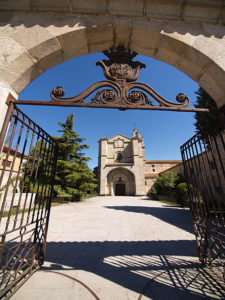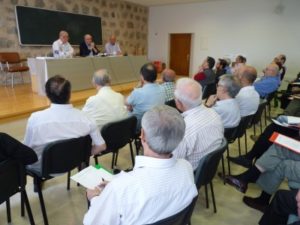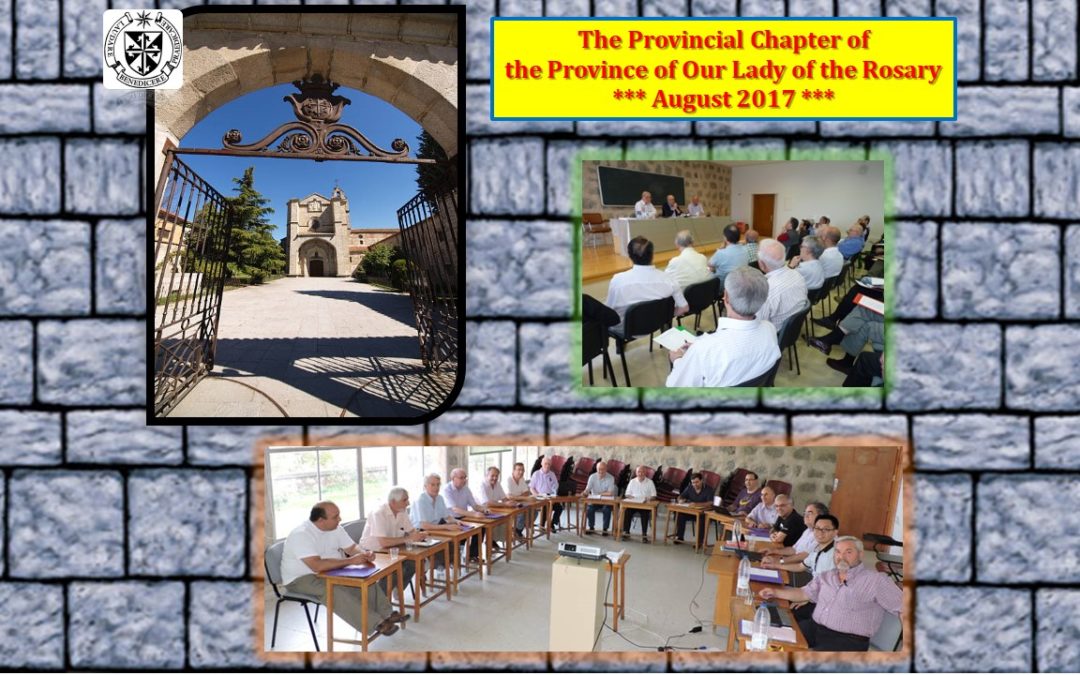Fr. Jarvis Sy Hao
melchiorshi@gmail.com
Part I

The Royal Convent of         Santo Tomas de Avila
From 1 to 19 August, 2017, the historic Royal Convent of Santo Tomas de Avila will once again receive the members of the Provincial Chapter of the Province of Our Lady of the Rosary which will be celebrated in this Convent.
A total of 34 chapter members also known as Chapter Fathers will gather to pray, to discern, to reflect, to discuss various topics related to the life of the Province and to seek direction and principles for the forthcoming four years.
The regular celebration of the Chapters whether Conventual, Provincial or General dates back from a very long tradition within the organization and legislation of the Order of Preachers. It is an exercise of co-responsibility, affirmation and renewal thus making the charism of preaching and service to the Church ancient yet ever new and creative in accord to the times.
Since the medieval times, Religious Orders had been organized into kingdoms, nations and regions for practical purposes of organization and governance. These entities are called “Provinces†evoking the terminology used by the ancient Roman Empire.
As a mendicant order, the Dominicans were divided into Provinces during the second General Chapter of 1220 and thus a basic organizational structure and government was established before the demise of S. Dominic in 1221.
One becomes a Dominican, he is filiated to a “provinceâ€, thus he called a “son” of the Province, usually for life unless he is assigned or transferred to another province of the Order by the Master of the Order. Because the province by cultural and religious influence, has a direct link with the life and ministry of the friars who belong to it, each province has a different way of doing things, traditions and customs which enrich the Dominican life.
Dominican life is lived in a community, which are the “cells” of our religious family and as all cells for their development need interchange, to be integrated to various levels in an organism (the Province, then the whole Order, vis-a vis, the local and universal Church …).
If a community has at least six brothers, it is called a “Conventus†and it is led by a prior, elected by his confreres for a three year term which can be renewed for another term.
Living in common, is not only praying, eating, and working together. In the spirit of co-responsibility, friars share the crux of common concerns through community meetings or conventual chapters. They also elect their prior who serves as the executor of the will of the community and the person in charge in our Dominican life.
If in a community, there are less than six friars, this is called “Domusâ€, or the house (has so to say a more provisional status, serves a contingent need or has not been able to become a priory) and the brothers of this house do not elect prior, but their “House superior†is appointed by the Provincial, usually with previous dialogue with the needs of the community.
The Prior Provincial, the major superior of the Province is elected for a term of four  (4) years. The election of major superior who will serve as the executor of the plans and ideals of the Provincial community and as representative of the Province is one of the important task of the Provincial Chapter.
Provinces
The organization of the Provinces is analogically similar to the organization of the Order and thus since time immemorial, with the great spirit of distributing powers and responsibilities to the communities and to individual friars. The Provinces play a very important role in the life of the Order in contrast to other religious Orders especially after the more centrist Society of Jesus was founded after the Council of Trent.
While in many modern congregations and religious institutes, their concept of the Province would be more on the geographical or territorial division of ministry, the Province in the Order is more than that, it becomes a living space to live the charism of the Order and thus there is a great spiritual affinity among the brethren in each Province. Moreover, each Province possesses a complete organization under the supervision of the Master of the Order and the General Curia; it also contains the legal and spiritual machinery to perpetuate its existence and guarantee the discharge of ministries entrusted.
The first provinces of the Order reflect the diverse presences and the wonderful expansion of the friars: Spain, Provence, France, Lombardy, Rome, Germany, Hungary and England. Eight hundred years later, while some Provinces had been suppressed by time and circumstance, merged with other entities or relegated into simpler entities, new ones too are being organized across the globe. Today, there are 84 “juridical presences†of Provinces, Vice Provinces and General Vicariates.
In the long list of the Dominican Provinces, number 25 is the Province of Our Lady of the Rosary, founded in 1587 “for the evangelization of China and its neighbouring kingdomsâ€. It is the only missionary Province of the Order and throughout its glorious history had contributed greatly in the evangelization of peoples and had produced a great number of martyrs for the Order and for the Church.
From the XVI century till the XX century it was the only Dominican entity in the Far East and had assumed diverse ministries and mission work in the region. She also founded various entities of the Order: Province of Queen of Martyrs of Viet nam (1967), Province of the Philippines (1971) and the Vice Province of Queen of China (Taiwan) (1978)
While maintaining the traditional ministries and missions of the Province in the Far East, the Province since the beginning of the XXI century had been blessed with new vocations and new foundations. Despite the challenge of aging and missions in need of renewal and new blood, new challenges in recruitment, formation, new presences and new realities seem to pump in much needed adrenaline to the ancient and still energetic “old Ladyâ€â€”the Province.
The chapter of 2017 is pivotal as the Order after the euphoria of the Eighth centenary had left a common desire among the brethren for renewal and to reaffirm our commitment for evangelization. How the province will respond to these challenges and new directions will be dependent on the foresight and leadership of the new team to be led by the new Prior Provincial.
Part II
The provincial chapter is made up of representatives of all the friars of the province. Since the outset of the convents were elected by their brethren – and were not named but only confirmed the higher authority – they represent them fully. In addition, each priory, to ensure adequate representation to so-called base, shall elect a member who will accompany the prior in his capacity as “sociusâ€, and shall enjoy the same rights as those who attend by virtue of their office. For large communities, the members of the conventual chapter may elect more than one socius.
As of 2016, our Province of Our Lady of the Rosary has a total of eight (8) priories: Four (4) in Asia, Two (3) in Spain and one (1) in the Philippines.

The meeting at the previous provincial Chapter
The brothers who are assigned to Domus or Houses are then organized into clusters so called electoral colleges consisting of 8-10 members where they elect one of the members as their delegate for the Provincial Chapter.
In our province, there are a total of XII electoral colleges.  They can be broken down as follows: 6 electoral colleges in Asia; 3 electoral colleges in Europe and three (3) electoral colleges from South America. In Asia, except for the I-II electoral colleges wherein the cluster is mixed from diverse regions or missions, the brethren working in the “frontiers†like Taiwan, South Korea, Union of Myanmar and Mainland China are assured of being represented.
Note here that in contrast with other Provinces, the Province of Our Lady of the Rosary has few convents and many Houses. This is due to the fact that many presences are made up of small communities and thus a good number of chapter fathers would be from the ranks of the electoral colleges.
Thus, between priories, their priors and socii, and delegates we arrived at a score of thirty (30) capitulars, they directly express diversity of cultures, realities and ministries of the Province around the world. With this number we ought to add the Prior Provincial who ends his terms on the Chapter; and the three Regional Priors of the Province (Vicariate of the Philippines, Japan and Venezuela). Thus arriving to the number of 34 members/electors.
It should also be noted that despite the fact that there are still a good number of Spanish friars in the Chapter, the number of non-Spaniards had increased since the last Provincial Chapters: and well represented as we shall have not only Spanish friars but also Chinese, Korean, Burmese and Venezuelan Chapter Fathers, perhaps one of the most diverse in the four hundred year history of the Province!
The principal task of the Provincial Chapter is to elect the Prior Provincial. He is the major superior of the Province and executes the plans and the directives of the Chapter in the coming four years.
After the election of the Prior Provincial, there will also be the election of those who will be part of the the executive team for the next four years: first, the diffinitors (six in number) which together with the Prior Provincial have the task of translating into directives, the guidelines and decisions of the Chapter and to appoint the officers of the province. After the chapter, the diffinitors shall serve as Provincial Councillors.
The Diffinitors as well as other councilors shall then form the advisory council that will help the prior provincial in his government during the next four years. From these pool of friars, the Prior Provincial shall then chose his socius (i.e. the friar chosen by him as a collaborator)
Among them would be the Provincial Syndic or Bursar and his assistants; the friars in charge of the various stages of formation and the different promoters within the Province; and all those to whom it is judged necessary to entrust a service to implement the decisions of the provincial chapter and promote the life and mission of the province.
In the same time, the Regent of Studies, the friar in charge of promoting the intellectual life and coordination of studies in the province will be appointed. Given the importance that traditionally the study of our Order, the regent is appointed by the chapter, but his name is proposed to the Master of the Order which is responsible for its creation.
Finally, it is responsibility of the provincial chapter to elect representatives to the general chapters of the Order, which are held every three years, alternately between provincial chapters and chapters of definition.
Part III
Evidently the provincial chapter is not limited to elect people but especially looks to the future by assessing the present and developing projects.
There are two important aspects of a Dominican Chapter whether it is a Provincial or a General Chapter.
It is a celebration of our Dominican mission and our ministries. Within the framework of prayer and common practice of discernment, the friars not only pray, celebrate but also reflect and discern the signs of the times and their response to the needs in accordance to their charism.
It is also a moment of discernment, especially when there arises moments of re-structuring, of opening new missions and closing old ministries and presence.
It is a moment of auto-criticism as brothers re- examine the oft talked about term of “quality of life†and how to tackle the challenges faced by the Province as a collective group. This is manifested through the work and reflection of various commissions of the Chapter, under various topics and themes for reflection.
The results of these reflections are found in the working document to be presented to the assembly and the various ordinations and recommendations to the friars.
The chapter in turn, incorporated this material will work for commissions on these topics and then present to all the province the guidelines for the coming years, giving concrete indications because in each of these areas the provincial community can realistically grow and mature, in short, to better enjoy his vocation.
In practice, the chapter establishes the provincial policy and reiterates or recreates its so called “mission-visionâ€.
It also legislates by determining or modifying the Provincial Statutes, either adding new rules or revising the rules in accordance to the latest decisions of the General Chapter or the new version of the Constitutions or directives from the General Curia.
It is also the responsibility of the provincial chapter to order the life and ministry of the Province for the coming four years; planning and coordinating the various ministries, whether collectively or individually.
It is also a moment of gratitude and memory: the Chapter is also a moment to relive the various events of the past four years, to be grateful to the Lord and at the same time to make memory of them, especially the deceased brothers. Thus part of the the Acts of the Chapter is the record of important events since the last Chapter and the necrology of the Province.
The Acts of the Provincial Chapter (and even more so those of the General Chapters) are at the service of the zeal and the apostolic creativity of the brethren; it tries to promote the apostolic “consensus†to that it may be able to work and live “in one heart and mind in God’s serviceâ€.
In the light of the forthcoming Provincial Chapter, it would be good for us to recall the spirit and the ideals laid down during the recent General Chapter of Bologna (2016) which coincided with the Jubilee of the Order:
our lives to follow Christ after the example of St. Dominic it is a life of contemplation of God’s Word and apostolic fraternity, which occurs in every community with its gifts and its weaknesses. This fraternity is rooted in obedience to the apostolic mandate and community in the implementation of this mission whose first condition is the sharing of our expectations, charisms, personal skills and material goods (205).
This apostolic fraternity is done with the community project (206) which is a good way to operate solidarity and dialogue, to facilitate the exercise of authority and obedience of the of the upper… (207)
Ultimately the Provincial Chapter is an instrument at the service of communities and friars so that they can more and better to grow in charity and be bearers of the Gospel to the world joy, the awareness of being alive and well connected parts of the Order and the Church.

The members of the previous provincial Chapter

